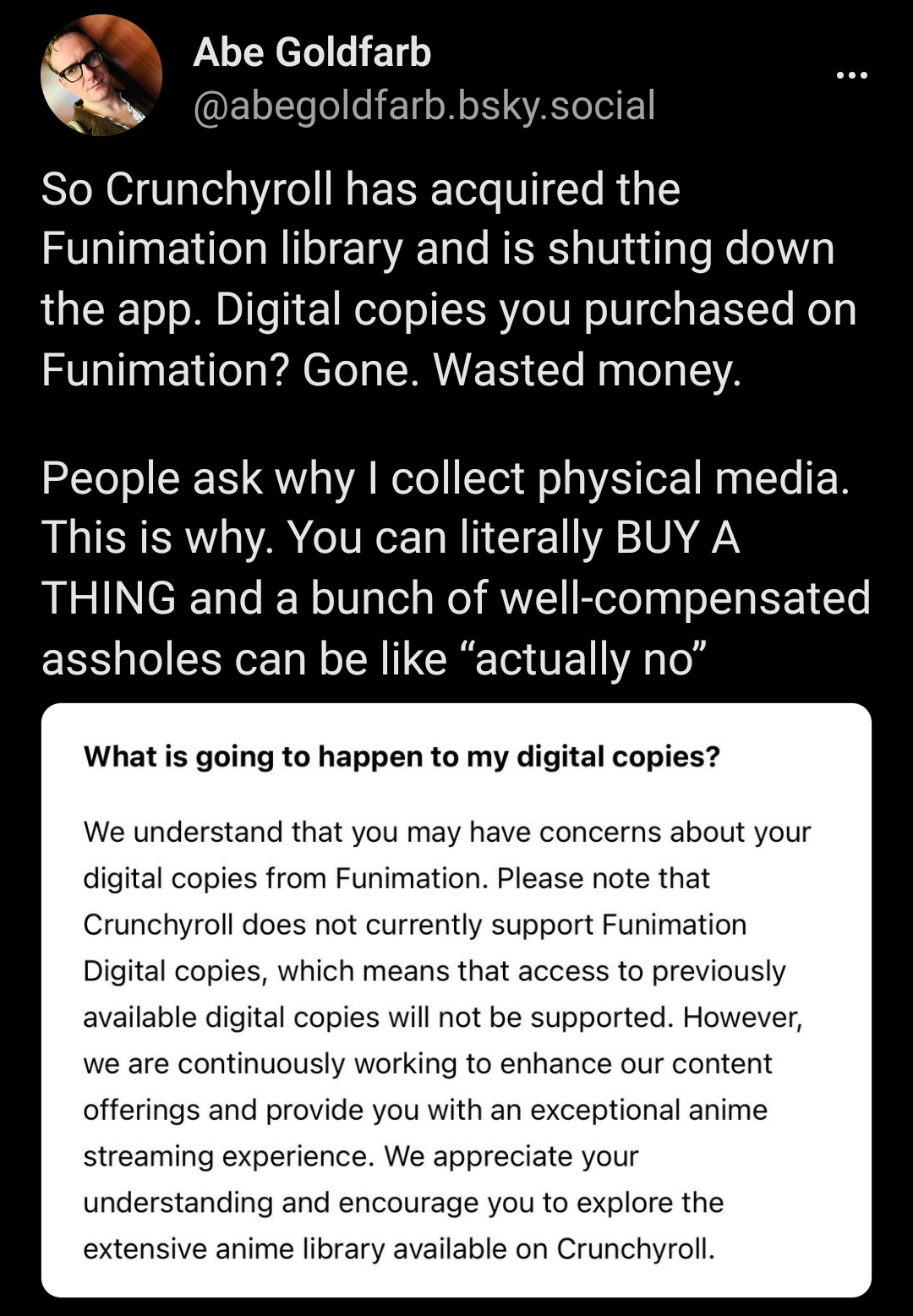this post was submitted on 08 Feb 2024
1379 points (98.2% liked)
People Twitter
5471 readers
1772 users here now
People tweeting stuff. We allow tweets from anyone.
RULES:
- Mark NSFW content.
- No doxxing people.
- Must be a pic of the tweet or similar. No direct links to the tweet.
- No bullying or international politcs
- Be excellent to each other.
- Provide an archived link to the tweet (or similar) being shown if it's a major figure or a politician.
founded 2 years ago
MODERATORS
you are viewing a single comment's thread
view the rest of the comments
view the rest of the comments

They're not ignoring your argument, your argument is simply flawed.
Stealing is different to pirating. You can say that both are wrong, but you can't claim that both are the same.
They are ignoring my argument. My argument is not flawed. We don't accept it in any other context with any other intangible items so I don't understand why it's acceptable here.
Yes, I can... and I am. They're both wrong because, whatever you call them, they're theft of something. Anything else is just a semantic argument. You're taking something and gaining a benefit from it without compensating the creator for it. We don't accept that in any other context, whether tangible or intangible.
Your argument is flawed, because piracy is different to theft. You say they are the same, when they are not.
There is a potential loss with piracy, but that isn't theft. Theft requires actual loss. This isn't a semantic argument, it is a core principle of the definition of theft.
No, my argument is specifically that piracy and theft are not different. My argument can't be flawed because they're different if the argument is that they're different. That's circular reasoning. You can't just say that they are different without pointing out how they are materially different in a way that a creator is properly compensated for the content that they created since that is the entire crux of my argument. If a creator isn't getting paid for someone consuming their work, then that's theft. We don't allow people to consume anything else they haven't paid for in any other context so, unless you can make a meaningful distinction for a creator, you haven't actually addressed the central premise of my argument.
It is not a potential loss, though. If someone consumes that media then it is a real, tangible loss. They consumed the media without paying for it. The idea that they may not have paid for it anyways is unresolvable with the idea that, if they hadn't paid for it and piracy wasn't an option, then they wouldn't have been able to consume that media.
I have pointed out how they're different, from my first comment to my last.
Theft involves taking a tangible asset from someone. It may also involve a potential loss in income.
Copyright infringement only involves the potential loss in income.
Your claim is that the producer has lost out with copyright infringement because of the time and effort and cost they put into making that thing. That cost would happen regardless of copyright infringement occurring. Thus you cannot assign the potential loss against the cost - it would have occurred either way.
No, it isn't.
Yes, they did.
Sure. But what you're ignoring is the idea of whether or not they would have bought instead of pirating.
If they would have paid, and didn't because they pirated, then there was a loss. If the wouldn't have paid but only consumed the material because it was free, then there is no loss. Thus, the loss is only potential.
The reality is that most of the content people pirate is not content they would have paid for, even if piracy was not an option. Thus, for the most part, piracy does not indicate any tangible loss.
I said materially different. You've pointed out ways they are different that have no bearing on my point and aren't relevant to it. You've mostly focused on the legal aspects of copyright infringement vs. physical theft which has nothing to do with my argument.
And now you've done it again. You're arguing the legality of copyright infringement and how it differs from physical theft which has no bearing on my position.
I'm not ignoring it. I've literally stated the argument against that statement several times - if they didn't buy it, they couldn't consume it if piracy didn't exist.
It wasn't free. That's why it's stealing.
Then they shouldn't be able to consume it! There's no issue if they wouldn't have paid for it if they don't consume it. The whole argument that they wouldn't have bought it becomes bullshit as soon as they do consume it because, without piracy, they would not have been able to consume it.
I'm not arguing the legality of it. I'm arguing the key definitions. Said definitions line up with law, because the law was established hundreds of years ago. Your definition is new and false. For some reason, you cannot accept that.
Would vs could. You're conflating the two. If they didn't buy it, and piracy was not an option, they most likely would not have consumed it. They most likely would not have paid you for it.
A pirated copy is not equal to a sale. If piracy was not an option, you wouldn't have had many more sales.
You keep touting this principle of yours as if it were fact. Frankly, you should accept that your business was a flop and move on, rather than blame people who did not want to pay you for your own failure.